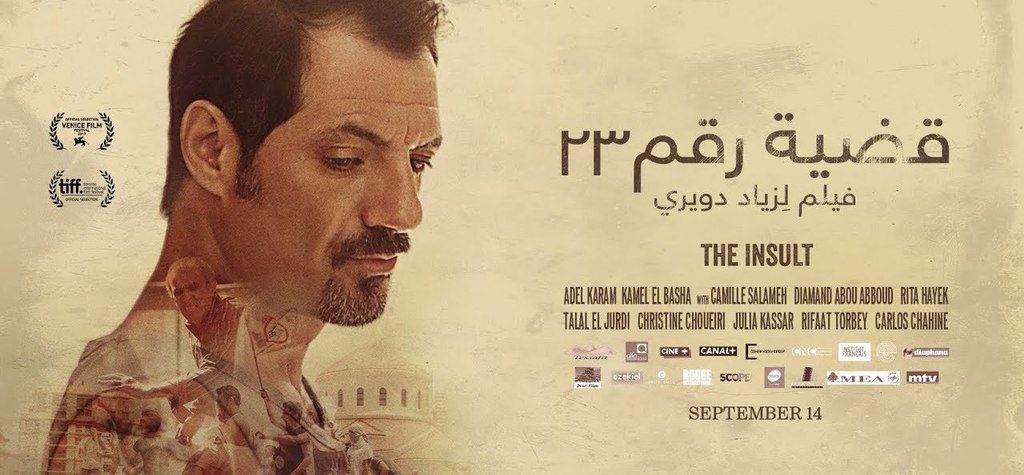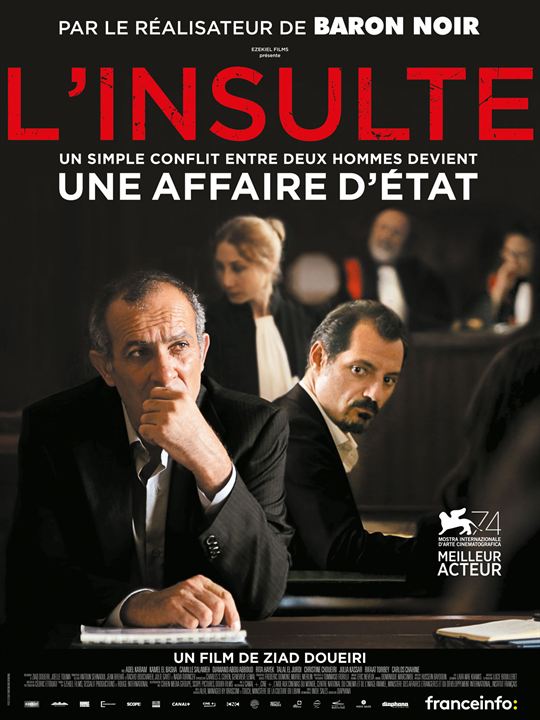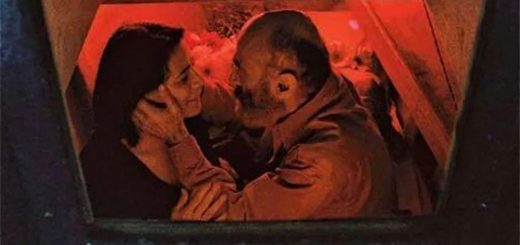L’insulte
L’insulte – The Insult – قضية رقم ٢٣
Au Liban, la guerre est finie mais pas dans la tête des gens. Même si le silence règne sur cet épisode récent de l’histoire. Alors au Liban, comme ailleurs, quand on a beaucoup perdu, sa famille, sa maison, ses repères, la religion devient un moyen de savoir qui l’ont est, ce qui nous reste. Quand tout pousse à ne plus savoir d’où l’on vient, quand la nationalité ou l’attachement à sa terre d’origine perd son sens, quand sa famille disparait ou s’éparpille, il reste une communauté humaine, ses semblables, ceux qui pensent comme soi, à laquelle on peut appartenir. Toni crie qu’il n’est pas Jésus-Christ pour tendre l’autre joue quand on le frappe, et pourtant lui et les siens revendiquent si fièrement leur identité chrétienne, que la croix est partout et Jésus est une effigie brandie sur les autocollants comme une star de football.
Le bébé dans le ventre de sa mère entend-il ce qu’il se dit et ce qui se passe au dehors ? La fierté arabe contre la fierté arabe. Se battre contre son propre orgueil, contre son passé aussi. La belle Rita Hayek, dans le rôle de Shirine, la compagne enceinte de Toni, cherche à lui faire entendre raison. Mais elle se tient à ses côtés, quoiqu’il arrive. Par fierté ? Par amour aussi.
Une insulte, banale, dans la rue, dégénère en un conflit quasi national. Toni contre Yasser, un jeu d’acteur en finesse absolue, et c’est le passé du Liban qui resurgit. Chrétiens contre musulmans, arabes d’ici contre réfugiés, arabes d’ailleurs. Massacre de Damour, contre ceux de Sabra et Shatila. « Personne n’a l’exclusivité de la souffrance ».
On cherche à soigner ses blessures de violence par de la violence encore. Le passé on peut s’en souvenir mais pas y vivre. Et il faudra toute la durée du film de Ziad Doueiri et son talent, pour faire sortir les personnages de leur passé, et leur donner, à tous, une grande respiration. Pour qu’à l’insulte puisse répondre le mot d’excuse, signe de grandeur d’âme et non de faiblesse d’homme.
Ce film est une coïncidence dans l’histoire personnelle de Ziad Doueiri à plusieurs points de vue. Sa propre dispute avec un plombier, arrosé par mégarde depuis son balcon à Beyrouth et les insultes qui ont suivi. Et à plus grande échelle, l’opposition grandissante entre le réalisateur et le mouvement BDS[1]. En cause, le fait que Doueiri a tourné son film précédent, L’attentat, en Israël en 2012. Tiré du magnifique roman de l’algérien Yasmina Khadra, il raconte justement l’histoire d’un chirurgien arabe israélien. Oui mais voilà, quand on est libanais, on ne va pas en Israël, quand on est réalisateur arabe, on ne fait pas de film en Israël, sans s’exposer violemment à la critique du monde arabe, et…au boycott. Ainsi, L’insulte ne sera montré ni en Palestine, ni en Jordanie. En Egypte, le cinéma qui le projette au Caire est au cœur d’intenses controverses. Et pourtant dit Doueiri, et pourtant le film est nommé aux Oscars, c’est suffisamment rare pour un film du monde arabe, une première pour un film libanais. Et pourtant dit Doueiri à juste titre, Kamel El Basha, talentueux acteur de théâtre palestinien qui interprète Yasser dans L’insulte, a reçu le prix d’interprétation à la Mostra de Venise, une première dans l’histoire de la Palestine, et le film n’est même pas montré chez lui. La cause de BDS est juste. Celle de Doueiri n’est pas différente. Et pourtant. BDS boycotte Doueiri. Alors Doueiri s’emporte, dénonce. Et boycotte. Et si le film emporte un Oscar en 2018, à quoi servira-t-il ? A montrer que le monde arabe est toujours aussi divisé, par orgueil, malgré tant de luttes communes ? Ou bien qu’il est temps de mettre en lumière et de faire connaitre ses multiples talents ?
« Les peuples arabes ont le don de se tirer en permanence des balles dans le pied », dixit Doueiri.
[1] Boycott, Disvest, Sanction, mouvement issu de la société civile palestinienne qui milite contre les colonies israéliennes en Palestine en prônant une action de sanctions internationales, à l’image de celles qui ont fini par faire chuter le régime d’apartheid en Afrique du Sud.
L’insulte, un film de Ziad Doueiri, France, Liban 2017
The Insult, by Ziad Doueiri
In Lebanon, the war is over but not in people’s heads. Even if silence reigns on this recent episode of history. Then in Lebanon, as elsewhere, when one has lost much, his family, his house, his landmarks, religion becomes a way of knowing oneself, what we have left. When everything happens so that we no longer know where we come from, when nationality or its land of origin loses its meaning, when his family disappears or scatters, there remains a human community, fellow men and women, those who think the same as we do, to whom we can belong. Toni shouts that he is not Jesus Christ to turn the other cheek when he is struck, and yet he and his people proudly claim their Christian identity, so that the Holy Cross is everywhere and Jesus is an effigy displayed on stickers like a football star.
Does the baby in his mother’s womb hear what it is said and what’s going on outside? Arab pride against Arab pride. Fighting against his own pride, against his past too. The beautiful Rita Hayek, in the role of Shirine, the pregnant companion of Toni, tries to turn him reasonable. But she stands by his side, whatever happens. Because of her pride? For love too.
An insult, banal, in the street, degenerates into a quasi-national conflict. Toni against Yasser, an acting game in absolute finesse, and the whole past of Lebanon resurfaces. Christians against Muslims, Arabs here against refugees, Arabs from elsewhere. The massacre of Damour, against those of Sabra and Shatila. « Nobody has the exclusivity of suffering. »
Seeking to cure his wounds of violence by violence again. The past can be remembered but not lived in. And it will take the duration of the film of Ziad Doueiri and his talent, to bring out the characters from their past, and give them, all, a deep breath. So that to the insult can be answer with a word of excuse, the sign of soul greatness, not that of weakness.
This film is a coincidence in Ziad Doueiri’s personal story from several points of view. His own argument with a plumber, inadvertently washed from his balcony in Beirut and the insults that followed. And on a larger scale, the growing opposition between the film director and the BDS movement [1]. Because the fact that Doueiri shot his previous film, The Attack, in Israel in 2012. Inspired by the beautiful novel by Algerian writer Yasmina Khadra, the film tells the story of an Israeli Arab surgeon. But when you’re Lebanese, you do not go to Israel, when you’re an Arab filmmaker, you do not make a film in Israel, without exposing yourself violently to the criticism of the Arab world, and … the boycott. Thus, The Insult won’t be shown neither in Palestine nor in Jordan. In Egypt, the theater that projects it in Cairo is at the heart of intense controversy. And yet said Doueiri, and yet the film is nominated for the Oscars, it is rare enough for a film of the Arab world, a first for a Lebanese film. And yet rightly said Doueiri, Kamel El Basha, a talented Palestinian theater actor who portrays Yasser in The Insult, received the Venice Film Festival’s Best Performance Award, a first in the history of Palestine, and the movie is not even shown at home. The cause of BDS is right. Doueiri’s is no different. And yet. BDS boycotts Doueiri. So Doueiri is raging and fulminates. And boycotts. So if the film wins an Oscar in 2018, what will it be for? To show that the Arab world is still divided, out of pride, despite so many common struggles? Or that it’s time to highlight and reveal its numerous talents?
with a plumber, inadvertently washed from his balcony in Beirut and the insults that followed. And on a larger scale, the growing opposition between the film director and the BDS movement [1]. Because the fact that Doueiri shot his previous film, The Attack, in Israel in 2012. Inspired by the beautiful novel by Algerian writer Yasmina Khadra, the film tells the story of an Israeli Arab surgeon. But when you’re Lebanese, you do not go to Israel, when you’re an Arab filmmaker, you do not make a film in Israel, without exposing yourself violently to the criticism of the Arab world, and … the boycott. Thus, The Insult won’t be shown neither in Palestine nor in Jordan. In Egypt, the theater that projects it in Cairo is at the heart of intense controversy. And yet said Doueiri, and yet the film is nominated for the Oscars, it is rare enough for a film of the Arab world, a first for a Lebanese film. And yet rightly said Doueiri, Kamel El Basha, a talented Palestinian theater actor who portrays Yasser in The Insult, received the Venice Film Festival’s Best Performance Award, a first in the history of Palestine, and the movie is not even shown at home. The cause of BDS is right. Doueiri’s is no different. And yet. BDS boycotts Doueiri. So Doueiri is raging and fulminates. And boycotts. So if the film wins an Oscar in 2018, what will it be for? To show that the Arab world is still divided, out of pride, despite so many common struggles? Or that it’s time to highlight and reveal its numerous talents?
« The Arab people have the ability to shoot themselves in the foot, » said Doueiri.
[1] Boycott, Disvest, Sanction, a Palestinian civil society movement that campaigns against Israeli settlements in Palestine and advocates international sanctions, such as those that ended the apartheid regime in South Africa.





















